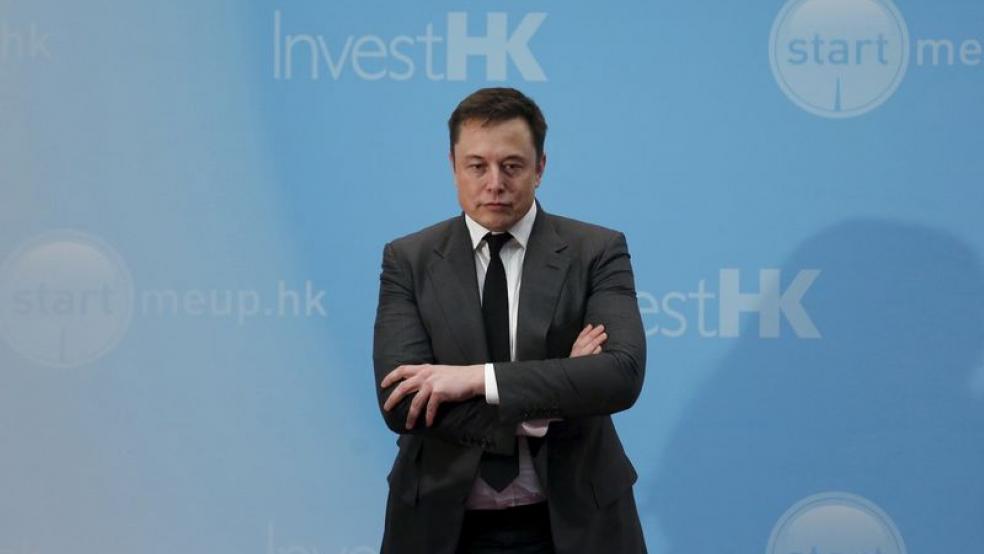Elon Musk has outlined his future plan for Tesla, but his history is what concerns some analysts.
Tesla's chief executive posted his "Master Plan, Part Deux" to the company blog Wednesday night, describing how he hopes to take Tesla from being a car manufacturer to a broader sustainable energy company with businesses in heavy trucks, mass transit and solar power.
Related: Why Elon Musk’s SpaceX Is Finally Ready to Rocket
The plan, in brief — and in Musk's words — was,
Create stunning solar roofs with seamlessly integrated battery storage
Expand the electric vehicle product line to address all major segments
Develop a self-driving capability that is 10X safer than manual via massive fleet learning
Enable your car to make money for you when you aren't using it
Some analysts acknowledge that the vision is grand, but voiced concerns over whether the company can meet its objectives. Tesla's financial health is a concern, as well as the company's trouble meeting production targets in the past.
Some of the criticism was strong.
"As is typical, Elon Musk has laid out a grandiose plan for the future with no time frames and few specifics, and no mention of how and when Tesla will be profitable," wrote Autotrader senior analyst Michelle Krebs, in comments sent to CNBC. "Tesla's latest Master includes expanding its electric vehicle product line to cover all major segments, when it hasn't been meeting production targets with the limited product line it has now and in the next couple of years."
Related: Elon Musk May Finally Get His Hyperloop – in Russia
In Wednesday's post, Musk described how acquiring SolarCity, which Tesla executives proposed in June, would allow Tesla to bundle its Powerwall battery product with solar panels. He also wants to add a pickup truck and luxury crossover to Tesla's line, expand into heavy-duty trucks and passenger buses, and push the company's autonomous technology forward.
But at least one analyst says there are a few loose ends to tie up before moving onto the new plan. "First off, Model X issues need to be solved," said Akshay Anand, an analyst at Kelley Blue Book in an email to CNBC. "Second, Tesla needs to deliver the Model 3 on time and reliable. Third, the Model 3 needs to sell to enough consumers to make the rest of Musk's plan feasible. It's awesome that Musk is really thinking about the future, but acting out the plan will be an interesting challenge."
Barclays Capital analyst Brian Johnson reiterated his past concerns over the financial health of the company. In a previous note, Johnson had said he would grade Tesla's execution so far at "a solid B+ (got there, but late) as a Popular Mechanics-style science project, but a D when it comes to the business/financial stewardship aspects of the plan."
In his newest note, Johnson observed that "Part Deux" excludes a lower-cost model — suggesting that while analysts had once compared Tesla to Ford, it may end up looking more like Daimler, with a luxury line, along with trucks and buses.
Other than that, the new plan plan "is like before — or like much of what Tesla does — long on exciting visions of the future and short on financial details," Johnson said in a research note Thursday. He conceded that "Tesla has executed well on the product side of the original master plan. But in doing so, it has dug a $4.2bn hole on the financial side that has necessitated a series of fund raises totaling $6.2bn."
Related: Elon Musk: Tesla Could Be Worth $1 Trillion
Johnson was skeptical of the Tesla Semi, since current heavy-duty trucks run on cost-effective diesel. But the idea of high passenger-density urban transport "makes sense."
Barclays has previously written that "pooled shared autonomous vehicles" — which they have compared to "UberPool without the driver" could very well become a major feature of future transportation.
However, "without 360 degree cameras and radars, we doubt that current Teslas can become truly autonomous," Johnson wrote.
The analyst finished his note by saying, "Of course, it's beyond us how much fundraising Tesla will need to carry out this master plan."
Johnson's rating on the stock remains underweight/neutral with a $165 price target. Tesla shares were recently trading down 2.9 percent at $221.75.
Joseph Spak of RBC Capital Markets remains "positive on the long-term opportunity," but rates the stock a "Sector Perform to fairly balance mid-term assumptions with execution risk." He wrote in a research note Thursday that "Tesla is a very innovative and disruptive company with strong growth ahead via disrupting large addressable markets. But it's also a classic story stock that is difficult to value given the investment decision is often qualitative vs. quantitative."
And Ben Kallo of Baird wrote in a note Thursday that Tesla's second master plan "outlines achievable long-term targets and we expect shares to move higher."
This article originally appeared on CNBC. Read more from CNBC:
Amazon is crushing it, and these are the stocks it is killing




